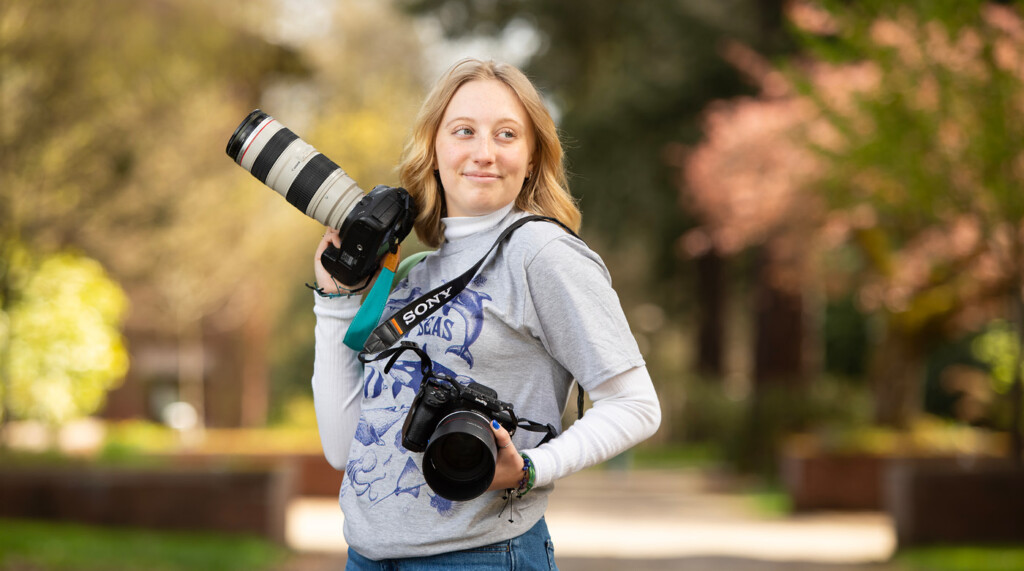Page 240 • (3,637 results in 0.059 seconds)
-
District.Asieh Mahyar Passionate about performing music from different cultures, Prof. Asieh Mahyar is the interim Director of Orchestral Studies at Pacific Lutheran University where she conducts the PLU Symphony Orchestra. Ms. Mahyar is a candidate in Doctor of Musical Arts in Orchestral Conducting at Michigan State University, where she studied with Octavio Más-Arocas and Katherine Kilburn. She received her MM in Orchestral Conducting from University of Massachusetts-Amherst under the mentorship of
-

. They have three CDs to their credit, all of which hit top-10 rankings with jazz stations all over the world. This nationally renowned treasure based in the Pacific Northwest has been featured by articles in Jazz Improv, LA Jazz Scene, Brass Herald and more. August 2 – David Deacon-Joyner Trio with Dennis Hastings David Deacon-Joyner is professor and director of jazz studies at PLU. A native of Memphis, Tenn., Deacon-Joyner was mentored by jazz piano great James Williams, and has performed with jazz
-

writing three scenes, and with the help of some PLU singers and software simulating an entire orchestra, they got to hear some of their work. “She was very intrigued with the music,” Youtz said. They decided to stop in the face of uncertainty. “Why would you write an entire opera if you don’t have a performance in mind?” Youtz pointed out. “That would be a lot of work, and maybe for nothing.” But then James Brown, chair of vocal studies and director of PLU’s opera programs, started talking with Youtz
-

Emma Stafki ’24 explores the challenges facing Puget Sound orcas in capstone documentary Posted by: Zach Powers / April 29, 2024 Image: Emma Stafki ’24 is a communication studies major from the Key Peninsula. (Photo by Sy Bean/PLU) April 29, 2024 By Lora ShinnPLU Marketing & Communications Guest Writer Emma Stafki grew up on Washington’s Key Peninsula, hearing stories about a tragedy in 1968. In nearby Vaughn Bay, her grandparents witnessed the heartwrenching capture of Hugo, a three-year-old
-
service or tenured or tenure-track faculty90%75% Tuition discount benefit amounts listed above are for full-time (1.0 FTE) employees working regular appointments. Benefit levels are prorated for part-time employees on regular appointments of at least half-time (.5 FTE) but less than full-time (1.0 FTE). The employee and his/her spouse or qualified domestic partner are eligible for undergraduate and master’s level studies. Employees, spouses and qualified domestic partners are limited to one master’s
-

contributors (10 from PLU) working on replications of eight highly cited psychological studies, it’s a major undertaking with international implications—and a multifaceted mission. CREP (rhymes with “grape”) not only helps validate psychological research findings; it also allows undergraduate students to engage in potentially publishable research. “Most student projects, the data go nowhere,” Grahe said. “In my classes I’ve always tried to get undergrads to do projects that might be publishable, but the
-

travel and interning for a conservation nonprofit. But now, she says, serving as a park ranger feels like the perfect fit. “I really love working for the Park Service because it’s an organization I can really believe in,” Plog said, “tasked with preserving places for future generations and also making sure people can enjoy them now. I love being part of that.” Plog, who is currently working at Yosemite National Park in California, double majored in communication and global studies at PLU. She also
-

, research methods, materials and data are shared digitally around the world to tackle inquiries. Why is this important? Traditional research can yield low replicability of previous studies. This suggests—in part— questionable research practices, including manipulating data to fit hypotheses and desired results, or worse yet, data fabrication. A “replicability crisis” (i.e., the inability to replicate earlier research findings), is addressed with open science practices. Benefits of open science include
-
quickly realizing it wasn’t a good fit, she struggled to find a landing spot. She quickly learned that her next choice, chemistry, wasn’t in the cards either. Then, with the help of Hames’ class, she discovered the depth and breadth of global studies. Public health quickly rose to the top of her interests within the field. She plans to continue exploring that topic on a global scale through study away. She’s considering enrolling in the semester Gateway program in Oaxaca, Mexico. “This definitely
-
. They have 15 conventional growers in the Puyallup/Kent/Mt. Vernon area they draw upon for local produce. They also work with 24 growers in Eastern Washington, plus numerous packing sheds. Tahoma Farms, a certified organic “first generation” family farm in Orting, WA. Along with trans-fat free oil in the fryers, heart-healthy olive and canola oils are used in everyday cooking. We also utilize specialty oils like sesame oil for many of our cultural dishes. Organic breads and rolls for sandwiches are
Do you have any feedback for us? If so, feel free to use our Feedback Form.


